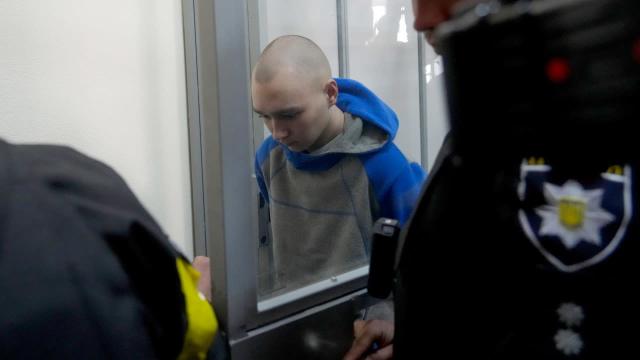
A small courtroom in Kyiv was full of journalists for the trial of a captured Russian soldier. He faces accusations of killing a Ukrainian civilian in the early days of the war. It is likewise the first of dozens of war crimes cases that Ukraine’s top prosecutor said her office is investigating.
Russian forces suffered heavy losses in a Ukrainian attack that destroyed a pontoon bridge they were using to try to cross a river in the east, Ukrainian and British officials said. It is another sign of Moscow’s struggle to salvage a war gone wrong as the trial of 21-year-old Russian Sgt. Vadim Shyshimarin began in the capital.
Ukraine’s airborne command posted photographs and video of a broken Russian pontoon bridge over the Siversky Donets River in Bilohorivka. Also, at least 73 Russian military vehicles were destroyed or damaged nearby.
Russia lost “significant armored maneuver elements” of at least one battalion tactical group, according to the British Defense Ministry. A Russian battalion tactical group has around 1,000 soldiers.
“Conducting river crossings in a contested environment is a highly risky maneuver and speaks to the pressure the Russian commanders are under to make progress in their operations in eastern Ukraine,” the ministry said in its daily intelligence update.
In other news, Turkish President Recep Tayyip Erdogan said his country is “not of a favorable opinion” toward Finland and, maybe, Sweden joining NATO, casting doubt on their plans. He also accused Sweden and other Scandinavian countries of helping Kurdish insurgents and others whom Turkey deems terrorists.
“Entering a new, long-term phase of the war”
Erdogan did not explicitly state that he would prevent the two countries from joining NATO. The military alliance, on the other hand, takes decisions by consensus. It means that each of its 30 members has a veto over who can join.
An expansion of NATO would be a setback for Russian President Vladimir Putin. He launched the conflict in response to the alliance’s eastward encroachment. However, in the aftermath of Russia’s invasion of Ukraine, other nations on Russia’s flank are concerned that they may be next.
With Russia’s offensive in the Donbas, Ukraine’s eastern industrial heartland turns into a grinding war of attrition. The European Union’s foreign affairs director revealed plans to provide Kyiv with an additional 500 million euros ($520 million) to buy heavy weapons.
Oleksii Reznikov, Ukraine’s defense minister, hailed the heavy weapons arriving on the front lines. But he conceded that there is no quick end to the war in sight.
“We are entering a new, long-term phase of the war,” he wrote in a Facebook post. “Extremely difficult weeks await us. How many there will be? No one can say for sure.”
The struggle for the Donbas has devolved into a back-and-forth grind with no big breakthroughs. Only a little ground was gaining on either side. President Volodymyr Zelenskyy said in his nighttime speech Friday that no one can tell how long the battle will endure. But his country’s soldiers have been making progress, including retaking six Ukrainian towns or villages in the last day.
Fierce fighting
According to Oleh Zhdanov, an independent Ukrainian military analyst, fierce fighting has erupted near the city of Severodonetsk on the Siversky Donets River. According to him, the Ukrainian military has conducted counterattacks but has been unable to stop Russia’s advance.
“The fate of a large portion of the Ukrainian army is being decided — there are about 40,000 Ukrainian soldiers,” he said.
Rubizhne is a city with a prewar population of roughly 55,000 people. It is practically under full control, according to the Ukrainian military leader for the Luhansk area of the Donbas.
Ukrainian rebels holed up in a steel mill in the destroyed southern port of Mariupol faced continuous Russian attacks on the city’s last pocket of resistance. Despite shortages of ammunition, food, water, and medication, Sviatoslav Palamar, deputy commander of Ukraine’s Azov Regiment, vowed his forces will hold out “as long as they can.”
On Friday, Ukrainian soldiers in white protective suits transferred Russian soldiers’ bodies onto refrigerated train wagons in Kyiv. White corpse bags were used to wrap the victims and they were stacked several levels thick.
Many hundred bodies were being housed on trains in the capital, according to Col. Volodymyr Lyamzin, who oversaw the operation. There were also several more storage trains throughout the country. He stated that Ukraine was willing to hand over the bodies to Russia, but that no deal had been reached.
The first war crimes case brought to trial
Shyshimarin could face life in jail if convicted of shooting a 62-year-old Ukrainian man in the head. He shot through an open car window in a village in the northeastern Sumy area on Feb. 28, four days after the invasion, in Ukraine’s first war crimes case brought to trial.
The defendant sat in a small glass cage during the hearings. It lasted about 15 minutes and will resume on Wednesday. He was clad in a blue and gray hoodie and gray sweatpants. International observers will be present during the trial to ensure fair conduction.
Shyshimarin was questioned about his rights and whether he desired a jury trial, among other things. He turned down the latter.
Victor Ovsyanikov, his Ukraine-based lawyer, has recognized that the proof against Shyshimarin is strong. But he has not yet stated what the soldier’s defense will be.
Shyshimarin is a member of a tank battalion that Ukrainian forces seized. He claimed in a video released by the Ukrainian Security Service that he shot the civilian because he was commanded to do so.
General Iryna Venediktova is the Ukrainian prosecutor. She is preparing war crimes charges against 41 Russian forces for attacking civilian infrastructure, killing civilians, rape, and also theft. She claimed that two people accused of bombing civilian infrastructure and residential buildings are in the hands of Ukrainians. It’s unclear how many of the suspects will face charges in their absence.






